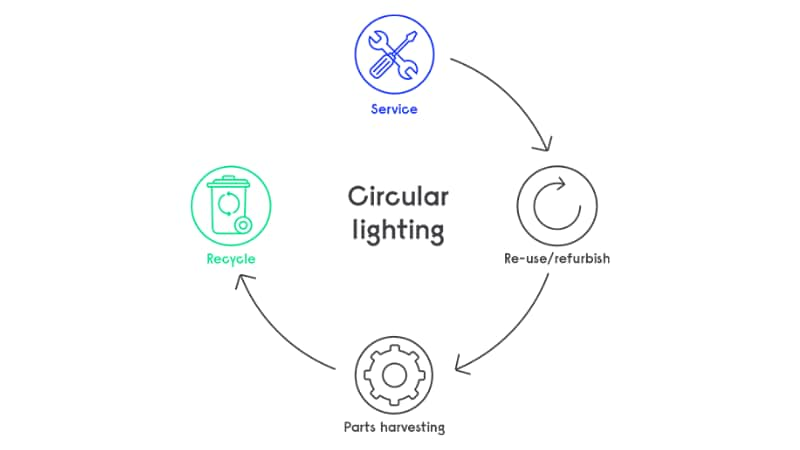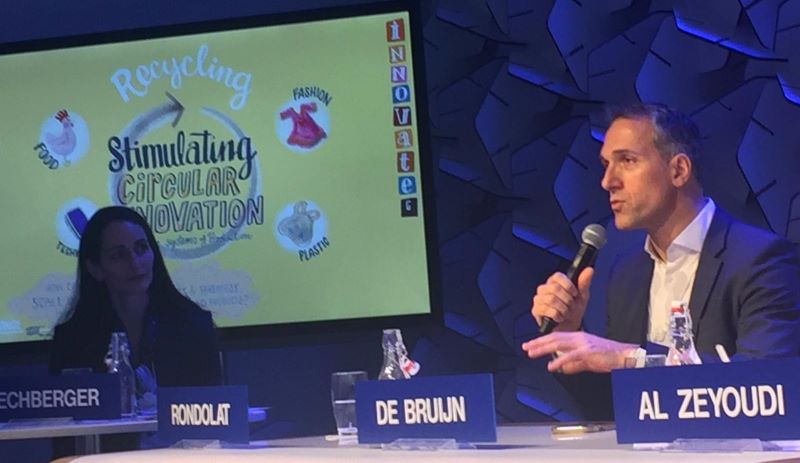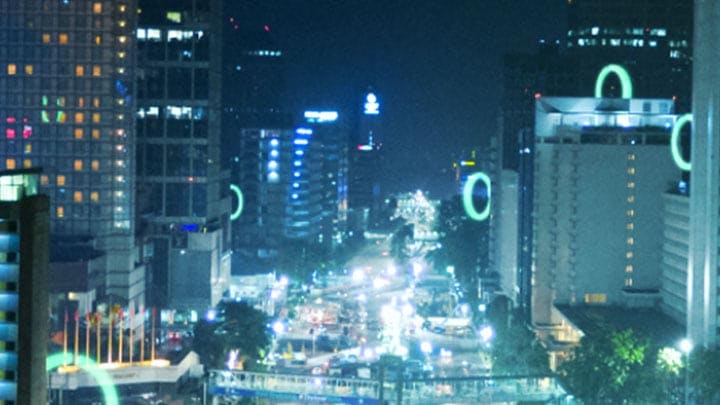January 24, 2020
A circular economic model can help eliminate waste and grow GDP. Here’s how.
Of the 70 million passengers who fly through Amsterdam’s Schiphol airport each year, it’s likely that very few of them consciously consider the lighting. Beneath the surface, they may feel a sense of calm as they pass a few moments in a relaxation area, and perhaps they find their gaze gently drawn towards the airfield and on to their next destination.
That’s good lighting design at play.

Behind the scenes, something revolutionary is happening. Schiphol’s Terminal Two lighting is part of a groundbreaking Light as a Service model that’s both efficient and sustainable. Lighting design, installation and maintenance can all be managed under one contract.
At the end of the contractual period, equipment can either be upgraded or returned to Signify to be recycled. It’s in everyone’s interest to optimize product lifespan and efficiency, and eliminate waste. This is the circular economy at work, right now, in the third-busiest airport in Europe.
The circular economy is “an economic system in which the generation of waste is being avoided throughout the entire value chain”. As a concept, it has been under discussion for decades, but with a renewed public focus on waste, and particularly in the use of plastics, the idea is ready for a wider stage.
Evidence around us is unequivocal: the current ‘take-make-waste’ model isn’t working. The equivalent of a truckload of plastic is dumped into the sea every minute of every day.
We’re consuming resources faster than ever before, yet only 9% of those resources find their way back into products after their first use. This can’t go on, and the public is beginning to take notice.
At this year’s Annual Meeting of the World Economic Forum, CEO Eric Rondolat brought Signify’s experience in pioneering this model to an audience with the power to make bold changes.
He argues that while the private sector can continue to drive innovation, the public procurement system holds the keys to unlocking large-scale, sustainable innovation projects that will eliminate waste, make optimal use of resources, and contribute to societal good.

Rondolat also points out that a transition to the circular economy doesn’t mean an end to creating and buying new things. It’s not about having less, but about adopting a model that extracts more value from the materials that go into the things we make and buy.
In the world of lighting, luminaires can be 3D printed, streamlining the production process to consume less energy and create a product with a 47% lower carbon footprint when compared to traditionally manufactured metal luminaire.
It’s even possible to create luminaires from materials that too often end up in landfill, like unwanted CDs. If this can be applied to lighting, other industries can do the same.
There’s more to waste reduction than reducing packaging or creating longer-lasting products. In horticulture, farms equipped with Signify’s horticultural lighting can produce crops in small spaces under optimal light conditions, eliminating pesticides and drastically reducing the use of water, one of the world’s most precious resources.
Innovations like 3D printing allow products to be manufactured close to their destination, reducing the carbon footprint of their journey to the customer.
The challenge is that current procurement policies – most notably in the public sector – focus only on obtaining the lowest initial cost. They rarely factor in the lifestyle impact of the product, the use of resources, or the potential for goods to be recycled. This one-dimensional measure of value too often means that the public loses out on projects that will bring long-term value, widespread economic gain, and broader societal benefit.
For Signify, the World Economic Forum isn’t just a talking shop, but a platform for concrete action. With some of the most influential minds in the world seeing the benefits of sustainable lighting, this could be the launchpad for a whole new way of thinking about our global resources.
Signify (Euronext: LIGHT) is the world leader in lighting for professionals, consumers and the Internet of Things. Our Philips products, Interact systems and data-enabled services, deliver business value and transform life in homes, buildings and public spaces. In 2023, we had sales of EUR 6.7 billion, approximately 32,000 employees and a presence in over 70 countries. We unlock the extraordinary potential of light for brighter lives and a better world. We have been in the Dow Jones Sustainability World Index since our IPO for seven consecutive years and have achieved the EcoVadis Platinum rating for four consecutive years, placing Signify in the top one percent of companies assessed. News from Signify can be found in the Newsroom, on X, LinkedIn and Instagram. Information for investors is located on the Investor Relations page.
